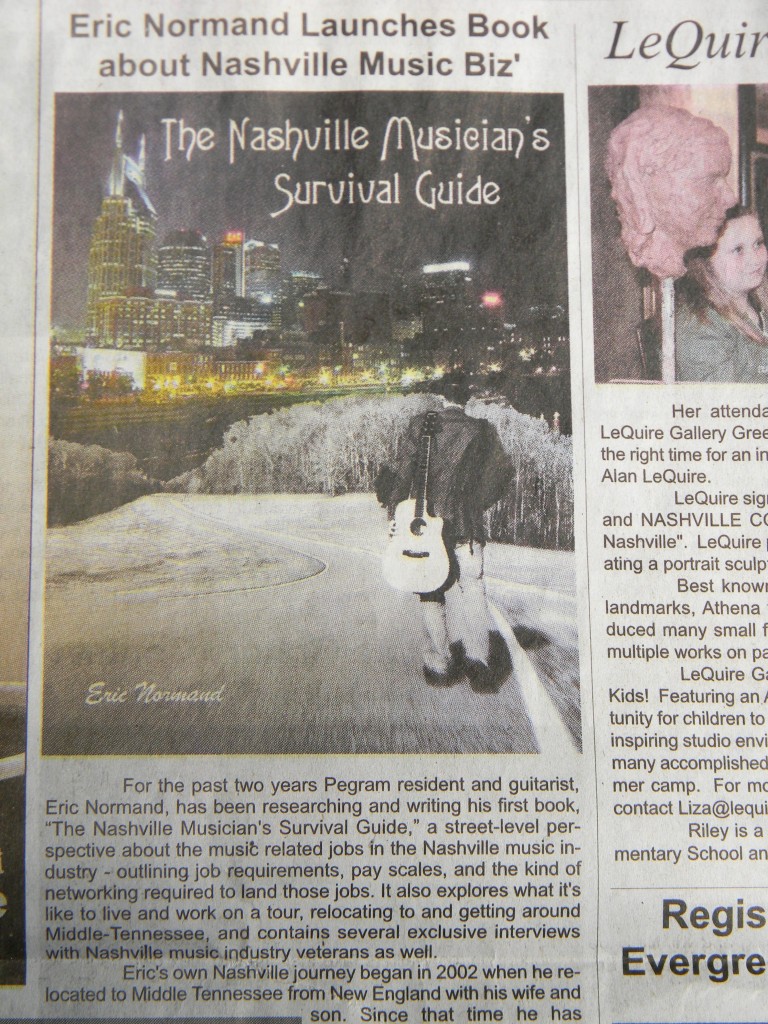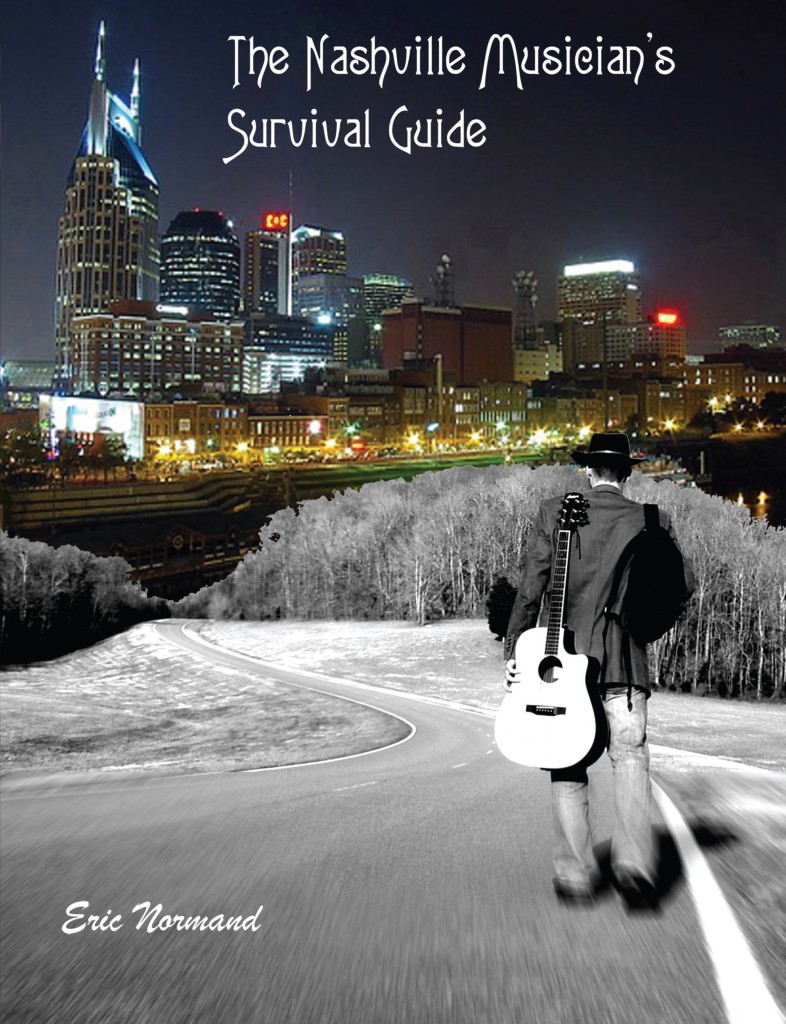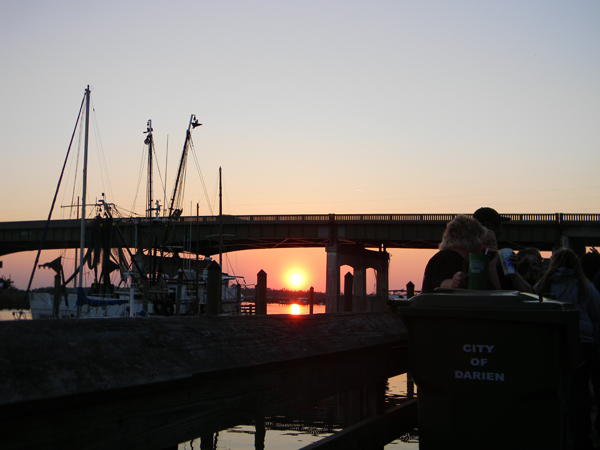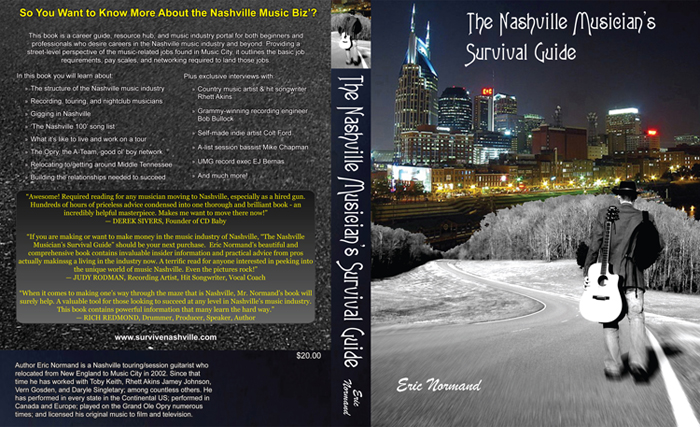Eric
The people you are meeting today and the relationships you build with them are what is going to give you work five years from now
Hey everybody, I realize that I haven’t been writing very many blogs over the past couple of months and I feel like I owe y’all a few. This lack of regular blogging is mostly because of the frantic pace I kept while trying to finish the book. I’m going to do my best to put out a new blog everyday (or so) for a while.
When I first moved to Nashville, back in the summer of 2002, I was hungry for work. But gigs, especially gigs that paid well, seemed few and far between. My mentor and friend, “D” gave me tons of good advice, including networking on the town as often as I could. I followed this advice, going out on the town four or five nights a week, taking every oddball gig that was offered, sitting in whenever I could, etc. After six months of this routine, although I was making a lot of friends and connections, I still didn’t have any consistent gigs that paid any real money to speak of.
So one day I told him “Things just don’t seem to be evolving very fast for me. I’m going out on the town all the time, sitting in, making friends and networking, but the phone just isn’t ringing very much. What am I doing wrong?”
His response was quite simple, although I wouldn’t entirely comprehend the entirety of it for a couple of years.
“Patience my boy, Rome wasn’t built in a day. This town goes at its own speed. You’re doing all the right things and making a good impression around town. Everyone I’ve introduced you to likes you and you’re building a good reputation for yourself. The people you are meeting today and the relationships you build with them are what is going to give you work five years from now.”
Although that last statement was probably the most important thing he said during our conversation, the things that I heard the loudest were “This town goes at its own speed,” and “five years.” Geeesh! The Nashville music scene goes in slow motion, and I have to wait five years to get busy – NOT exactly what I wanted to hear!
But looking back at that moment, now going on 10 years into my Nashville life, those telling words make so much sense. I met a lot of people during that first hard year of Nashville – musicians, engineers, songwriters, artists, etc. – and became friends with many of them. In the years that followed, many of these friends and acquaintances would eventually call me for work. Sometimes it was a simple “one-off” gig, other times it was several gigs, sometimes it was songwriter demos.
In 2006 I did a ton of gigs on Broadway, mostly at Tootsies, but also at The Stage and a few other clubs on the strip. It was good supplemental income, good for my chops, and I met and gigged with several great players whom I became good friends with in the years that followed. These gigs all started with one phone call from a guitar player friend I had met during my first couple of months in town. He subbed out a few gigs to me, these gigs led to more gigs, and before I knew it I had all the work I could handle on the strip – All because of one relationship.
Several years later I was working more as a touring musician and no longer gigging regularly downtown. On many occasions I found myself in need of musicians for different situations, and ended up calling players I had met during those earlier years of steady gigging on Broadway. Sometimes I would need a player last minute and call someone I hadn’t even spoken to for a couple of years, someone that had obviously made a good impression at an earlier point in time.
I have learned that the town (and life for that matter) does go at its own speed, and quite often that speed is slower than we would all like. But I have also learned that there really is a lot of truth to “The people you are meeting today and the relationships you build with them are what is going to give you work five years from now.”
As some of you may know, and for those of you who don’t know, I have just released my book “The Nashville Musician’s Survival Guide.” This street-level perspective of the music-related jobs in the Nashville music industry is now available in print version, and the e-book will be available within a few days. To purchase your own copy, follow this link.
Book Release Party for “The Nashville Musician’s Survival Guide”
Come out tonight for the official book release party for “The Nashville Musician’s Survival Guide” at The Fillin’ Station in Kingston Springs, TN (7 – 11). Many of the contributors to the project will be in attendance and the first three people to ask will receive a free copy of the book. My band will be playing featuring former “G-man,” Mike Chapman on bass; Nick “Shaggy Bag” Forchione on drums; and me on vocals and guitar. There might even be a few special guests.
After 2+ long years of research and writing, I’m excited to get this book out into the world. This project has been all about paying it forward, and I believe this book will prove to be a useful tool for many musicians trying to find their way in this crazy business. This will be a very special night, and one to remember for a long time to come. So come on out for the festivities!
The Fillin’ Station
385 North Main St.
Kingston Springs, TN 37082
phone: 615-952-2100
Directions from downtown Nashville:
Take I-40 West to exit 188 (Kingston Springs)
Go right at end of exit onto SR-249 (Luyben Hills Rd.)
Go 300 yards turn left onto Kingston Springs Road
After 1.3 miles you’ll come to a stop sign – turn right onto North Main St.
The Fillin’ Station is about 400 feet on the left (the last business in a small strip mall)
“The Nashville Musician’s Survival Guide” Is Here!
That’s right everybody, the book really is finally done and now available to all who have been patiently awaiting its arrival. Orders for the print version will be processed and shipped this week, the e-book and Kindle version will be ready and available by the middle of next week, and I can’t tell you how excited I am to finally be at this point in time! Others involved in the project are getting excited too. Check out these back cover blurbs that a couple of folks offered after checking out advance copies:
“Awesome! Required reading for any musician moving to Nashville, especially as a hired gun.
Hundreds of hours of priceless advice condensed into one thorough and brilliant book
– an incredibly helpful masterpiece. Makes me want to move there now!”
— DEREK SIVERS, Founder of CD Baby
And:
“If you are making or want to make money in the music industry of Nashville, “The Nashville Musician’s Survival Guide” should be your next purchase. Eric Normand’s beautiful and comprehensive book contains invaluable insider information and practical advice from pros actually making a living in the industry now. A terrific read for anyone interested in peeking into the unique world of music Nashville. Even the pictures rock!”
— JUDY RODMAN, Vocal Coach, Producer, Hit Songwriter
As you could imagine, there was a big celebration at the Normand house when these e-mails arrived!
When I embarked on this journey two years ago last January, I had no idea I would be entering the world of book self publishing. In fact, when I initially began writing the content that became the foundation of this book, I had no intention of writing a book at all, or even the knowledge about how to go about doing this. At that point in time, I was simply trying to help a few folks on Craigslist and other message boards who wanted some info about the Nashville music biz’. The next thing I knew I was writing a book, almost by accident. The more I wrote, the more I began to understand the massive scope of this project, and the work it would entail to finish it – Internet research, extensive recorded interviews, photo taking excursions, etc. At some point along the way the book began writing itself. It was as if I was a mere conduit, the end result first being the story of the modern-day Nashville music industry magically appearing on my computer screen, and now in this wonderment of a book.
I couldn’t have done it alone either. Dozens and dozens of people have contributed their time and resources to this project and for this I am eternally thankful, their contributions have made this a far greater book than I could have produced alone. While the entirety of this project has been a massive undertaking (there were many times that I felt as if I would be writing this book for the rest of my life), this has truly been a labor of love – my way of paying forward all that I have learned in this strange place we call Music City, and I am absolutely thrilled with the end result.
So if you’ve been waiting for this book, it really is finally here. Thanks for your patience and I hope you enjoy reading “The Nashville Musicians Survival Guide!”
P.S. If you live in middle Tennessee, I would like to invite you to our official book release party at The Fillin’ Station in Kingston Springs on Saturday, April 30 from 7 to 11. Many of the contributors to the project will be in attendance on this night, there will be music performed by my band (Mike Chapman will be on bass and Fran Breen on drums), and the first three people to ask will receive a free copy of the book.
“Blessing of the Fleet” with Rhett Akins in Darien, Georgia
After several days of heavy rain had inundated the coastal town of Darien, Georgia, I was more than pleased to view a beautiful sunny day out the window when I first walked to the front lounge of our bus last Friday morning. All week long I had feared a washout for our 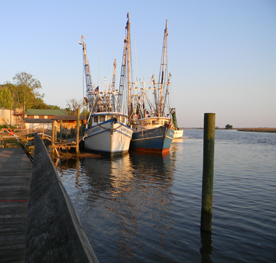 concert at the annual “Blessing of the Fleet” in the picturesque fishing community of Darien, so it was comforting to know that the weather would be on our side for this one. A little while later we landed our bus at the concert site – a homey little park lined with majestic old trees covered in Spanish moss on one side; and a long, riverside dock lined with fishing boats that abutted the river inlet that led to the Atlantic Ocean on the other.
concert at the annual “Blessing of the Fleet” in the picturesque fishing community of Darien, so it was comforting to know that the weather would be on our side for this one. A little while later we landed our bus at the concert site – a homey little park lined with majestic old trees covered in Spanish moss on one side; and a long, riverside dock lined with fishing boats that abutted the river inlet that led to the Atlantic Ocean on the other.
Darien, Georgia, is a town right of southern folklore, and retains a unique feeling and charm despite its rocky history. Built right on the Altamaha River in 1736 by Scottish Highlanders, it was a historic battleground during the Civil War where black troops saw some of their first action. On June 11, 1863, the town was looted and “burned to the ground” by Federal Troops, an act that would later be referred to as a “Satanic Action” by Colonel Robert Gould Shaw, the reluctant commander whose troops committed the act. Darien was rebuilt after the Civil War ended, and would eventually become a fishing village, with wild Georgia shrimp becoming a major part of the local community’s livelihood.
Of course we would be fortunate to experience some of this fine local seafood firsthand shortly after sound check when we were treated to a dinner at “Skippers Fish Camp,” a cozy little restaurant that sat right on the edge of the river. After dinner and a little downtime, the sun began to set and the park began to come alive with activity. As the warmth of the sun began to fade, an amazing sunset briefly 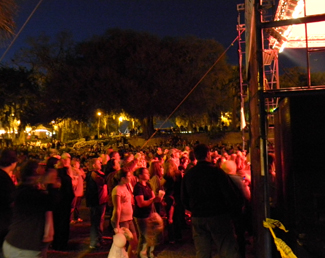 appeared over the nearby bridge overpass, and the sky became a deep red until the sun disappeared beneath the horizon. Darkness now upon us, the grounds began to quickly fill with locals and concertgoers while a local band took the stage to heat things up for Rhett’s show.
appeared over the nearby bridge overpass, and the sky became a deep red until the sun disappeared beneath the horizon. Darkness now upon us, the grounds began to quickly fill with locals and concertgoers while a local band took the stage to heat things up for Rhett’s show.
A little while later it was show-time and the park was filled to capacity. Concertgoers covered every visible square inch of grass in the park, lined the hill to our right, and filled the docks to our left. Meanwhile others enjoyed the show while hanging out on the dozens of boats that were tied to the dock. Rhett was in great form and ran through his set of radio friendly hits, a few renditions of his favorite classics, and our own versions of some of his most recent songwriting masterpieces – “The Shape I’m in” recently cut by Joe Nichols being one of the standouts.
The crowd on this warm and vibrant night was festive and on our side from the start. They were quite vocal too, cheering loudly after every song, and singing along with many. When the main part of the show ended; the strong, roaring applause warranted an encore, and we returned to the stage for a few more. By the time we left the stage for the last time on this evening, we had played an hour and 45 minute set, and fun was truly had by all.
minute set, and fun was truly had by all.
I find it inspiring to see that Rhett, despite having such recent, major success as a full-time songwriter, still loves to perform live. Regardless of the kind of day he is having, when he hits the stage, he gives his all to the performance at hand, and to the people who came to see him. This kind of energy and focus makes it easy for the rest of us to play with the same kind of fervor. A small town like Darien, Georgia, with a population of around 2000, doesn’t have a festival or concert on this level very often, and their appreciation of our performance was both genuine, and evident. By the time we were heading back to Nashville, we all had a good feeling about our short stay in Darien. The town had been a wonderful host, and we were happy to help this community feel good on this day.
In the world of the touring musician, years of playing live shows can render concerts to be a bit of a blur, with one show blending into the next. But all of these shows do matter – each concert can, and should be a special event. When we visit a small community like Darien for a brief moment as this, it can have a lasting impact on people. This was also the case when we performed in the small town of Winchester, Tennessee, a few weeks ago. Even though the crowd wasn’t particularly large in Winchester, maybe two or three hundred folks in a local high school gym, everyone in attendance that night left with a smile. When you give your all to these folks, you might to help create a special memory that could last a lifetime, at least for some. I believe that this sense of community and goodwill is at the core of many a great performer. The great feeling we got at the show from the people of Darien last Friday is why many of us musicians love what we do, and this helps make being a musician a noble and worthy endeavor. Thanks Darien!
Every Day Gets Me a Little Bit Closer
It amazes me how every day is so packed full of tasks. As soon as I’m finished with breakfast, I excitedly walk up to my office, sit down at my computer, and dig in to this book project that has all but consumed my life for the past two years. I’m about two days away from sending the finished PDF off to the printer, yet it still seems like it’s never actually going to happen.
Yesterday’s big task was all about finishing the cover design. I had some major help with this all-so crucial and final last step. This help came in the form of the world’s greatest graphic designer (AKA my wife, Kelly). The cover came out great. The front cover art was completed last year, but we still had to design the spine, and the back cover. According to “Dan Poynter’s Self-Publishing Manual,” the back cover is the most important element of your books exterior. For it is the back cover text that will ultimately cause a potential customer to look inside, and hopefully purchase the book, or, put it back on the shelf and pass on it. And of course, it must have a look and feel that makes people want to read it when they pick it up.
We looked at several other books for ideas as a starting point for our cover design. One of them was “I, Alex Cross” by James Patterson, a very cool looking, and eye-catching book exterior. After hours and hours off trial and error, experimenting in Photoshop, etc., we arrived at a finished design that does justice to this manuscript. While the cover concept was completely Kelly’s brainchild, I was the chief laborer in this massive endeavor. Almost every time I had a question, her answer was simply “Google it.” This was not because she didn’t know the answer, but because she knew I was capable of figuring it out myself – and that by figuring it out myself, I would actually learn something:)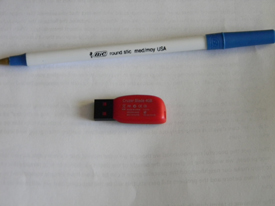
There was one other interesting moment in the last couple of days. Last week I took a flash drive down to Staples and had them print out the entire manuscript on premium copy paper, and then fasten it together with a ring binder. This was so we could give the book one last proof read, check for photo resolution, formatting, etc. (there’s a lot of stress involved when you’re about to spend thousands of dollars to print a book no one has even read yet.) But the funny moment came just before leaving for Staples when I put the flash drive on the kitchen table and made the comment “So there it is, my entire life’s work for the last two years reduced to one, microscopic flash drive, barely the size of a walnut.” It seemed so strange and surreal.
Anyway, just a few more details and I will be done with all the “tasks” required to get this long awaited book out into the world. I really am getting close, but it still seems like I will never finish. Well that’s it for now; got to get back to those tasks …I’ll keep you posted!
Why a Berklee Education Is a Good Thing, and Why Bragging About It Can Be a Bad Thing
If I think back to when I first got out of the Berklee College of Music, back in 1989, I remember feeling excited about all I had learned. My head still spinning from the intense and rapid absorption of so much musical information, I also felt a confidence with this newfound knowledge. As I was a young man in my early 20s, this confidence, at times, perhaps bordered cockiness. But still, I had worked hard at Berklee, gained valuable knowledge about music theory, and was proud of this achievement, eager to share this fact with everyone I knew.
“There is a difference between conceit and confidence. Conceit is bragging about yourself. Confidence means you believe you can get the job done.” – Johnny Unitas
But just because you’re fresh off the Berklee boat doesn’t mean everyone wants to hear you announcing this fact, as I would quickly learn. Right after I got out that spring I replied to a couple of classified ads that were looking for a guitarist. One of the conversations went something like this:
“Hello, this is Charlie.” “Hi, my name is Eric and I just got out of Berklee. I’m calling about the ad for a guitar player.” “Click.” It seems I had no sooner said the word “Berklee” before he was hanging up the phone. What’s up with that?
In the years that would follow, I heard similar stories from others, and would also encounter some folks who seemed to resent me simply because I had this education. I remember one time going to see a rock band in a local bar and enjoying listening to the guitar player, who was someone I knew. When I was chatting with him on a break, I asked him about a certain chord he had played in a blues song. “What was that chord you played in Stormy Monday? I’ve never seen it used before.” “I don’t know. You went to Berklee, you tell me.” Ouch, I was shellshocked! I couldn’t understand this hostility, as I was genuinely curious about what he had been playing.
Perhaps he didn’t know the name of this particular chord and felt embarrassed. Perhaps he wishes he had been able to go to a music college and was simply jealous. Maybe I had bragged too much after getting out of school and was unknowingly being perceived as being cocky, and he simply assumed this was at least partially a result of my Berklee experience. Whatever it was, there was apparently some resentment on his behalf to the fact that I had gone to Berklee.
Of course, I wasn’t entirely innocent in every situation either. I remember sitting in at a blues jam somewhere during that time period. After sitting around all night waiting for my turn to play, when it was finally my turn, I felt compelled to share every note I knew (which was a flurry of modal insanity played in rapid fire succession back then), to perhaps “enlighten” what I perceived as a bunch of simplistic, blues musicians. And then I wondered why I only got to play one song. I’m sure I wasn’t the first young gun fresh out of Berklee to make this mistake.
“Knowledge is power.” – Francis Bacon
That was all a long time ago. During those first years immediately following Berklee, I was still trying to figure out how to apply all that theory to practical, everyday musical situations. Slowly, over time, that knowledge began to morph into my everyday musical applications; it started to really become a part of my being. Eventually, I reached a point where I no longer thought about music theory; I just played and heard music, understanding its technicality on a more subconscious level. As theory and music became one in the same, it got easier to play music.
I never use my Berklee education as a conversation piece, unless asked. If someone asks me about my musical training, I don’t hesitate to tell them I went to Berklee. If they are still interested after I tell them that, I’m genuinely excited to share more. I’m certainly not embarrassed about going to Berklee, I’m quite proud of that accomplishment, even though there is a weird stigma attached to it for some.
“Teachers open the door… You enter by yourself.” – Chinese Proverb
Just because you go to Berklee doesn’t automatically make you a great musician. Are all doctors great just because they went to a great medical school? I think not. The school doesn’t make the doctor great, the doctor has to become great at what he does, the school only serves to get him started.
So maybe that’s part of the reason why there’s a weird stigma attached to “Berklee folk”. It’s a great school, but that doesn’t mean you’re automatically great just because you go there. A great college education is simply a foundation, a starting point. It’s what you do with that education, how responsibly you wield your newfound knowledge, and the persona you exude that will create lasting impressions on those around you.
“You never get a second chance to make a first impression.”
How would you perceive a stranger if the first thing they said to you was “Hi, I’m Joe, I just graduated from Harvard.” Depending on the circumstances, my first reaction could be “What a cocky f@#k!” I’ll be be more likely to like that person if they simply said “Hi, I’m Joe, I just moved to town. Good to meet you.” If someone walks into a room full of people and upon being introduced says “Hi I’m Joe, I just got out of Berklee.” it might come across to some as “Hi, I’m Joe, I just got out of Berklee, and therefore, I’m probably better than you, as many musicians don’t have this level of education.”
You never know what preconceived notions someone might have about a particular music school or other entity. To some, it might be a good thing, but to others, it will instantly bring to mind whatever their preconceived notion might be, and they will instantly associate you with that previous perception, even if it’s incorrect. Don’t give them that opportunity. Let them form their own opinions of you based on a neutral starting point.
So don’t wave your credentials in the face of others, but don’t hide them either. Don’t play every note in your arsenal just because you can. And if you have a music education, whether it’s from Berklee or another college, don’t expect that fact alone to open doors. Knowledge is power, and it will definitely come in handy. But an education doesn’t define people or make them great; it’s simply a foundation that should serve to make them better.
Nashville Musician’s Survival Guide Preview And Release
April 18, 2011 – A Date That Will Live in Infamy! (Sorry, I couldn’t resist). Monday, April 18 is our new, official release date for this long overdue book about the Nashville music biz’. When I first embarked on this project, some two years ago, my thoughts were simply “there seems to be a void of information out there about the Nashville music industry, so I’m gonna write a book about it. I mean, how hard can it be?” This was probably the biggest understatement of the century. I had no idea how to write a book at that point in time, I just knew that this book needed to be written. So I wrote, and wrote, and wrote. A year later, I thought I was done writing. At that moment, it seemed finished. I turned my manuscript into a PDF and had a couple of rough drafts printed. As I read through this document I made many corrections and notes, and by the time I was finished, I realized I hadn’t covered all the bases.
So then the project entered phase 2. I had a handful of new chapters that I needed to write, but I also decided to pursue some more interviews, my thought being that this would help broaden the books perspective and appeal. Around that same time I bought the book “Dan Poyntner’s Self Publishing Manual.” After skimming through this fascinating must-read for first-time authors, I began to compile a massive “to do” list. It seems there were dozens, if not hundreds, of little details (many that turned into huge details) I hadn’t thought of – things like: writing back cover copy, purchasing an ISPN number, setting up a P.O. Box, setting it up as an e-book, photo permissions, photo captions, and of course, what is often the most neglected task of authors, marketing.
I also learned in my research that, in general, traditional book deals do very little advertising for their authors. If an author wants their book to sell, unless their name is James Patterson or Stephen King, they must promote their own book. As I am self-publishing, this means that promotion is entirely up to me. Enter Eric, the blogger. Not only has blogging turned out to be a great way to build a readership, it’s been a fun and exciting learning experience as well. Writing a new blog every few days about everything from my shows on the road with Rhett Akins, to the Nashville flood, to self-help tips for musicians, to progress on my book, has been very rewarding. For instance, after writing a blog a few weeks ago about tinnitus, I got a few e-mails from different musicians informing me that they are buying earplugs.
At the same time I began blogging, I began soliciting “chapter reviews” by my peers and experts in the industry, as was suggested in the self-publishing guide. By involving other individuals as contributors, this not only served to further help market the book, but it also greatly improved its content.
The next hurdle turned out to be the interior design. Upon looking into hiring someone for this task, it quickly became obvious it would be extremely expensive. This discovery prompted me to get creative and learn how to do it myself. My wife, Kelly, acquired some tutoring help to learn Adobe’s InDesign software, taught me the basics of what she learned, and then I managed to completely submerge myself in the interior of this book for the past several months.
Well doggone it, I think I finally got it. The design is essentially finished, (just waiting on a few final copy edit changes from one of my copy editors) and will soon be sent to Create Space for final approval and printing – WooHoo! I have been waiting for this moment for almost 2 years. I mean, this project has all but completely taken me over, and as much as I have learned and grown in the process, it will be nice to have my life back.
So in the meantime, check out the beautiful PDF preview (if I don’t say so myself). This will give you some idea about the final version which will be released on Monday, April 18 – A Date That Will Live In… (whoops, sorry, it almost happened again!)
P.S. You can make an advance purchase of your copy of the book to our new online store we just set up. This will not only guarantee immediate delivery the day our first shipment of books arrives, it will also help me pay for some upfront printing costs.
P.S.S You may notice I have put a CD and audio downloads for sale in the store as well. This CD “Songs Without Words” is an instrumental project I recorded in 2003 while I was on a break from the Toby Keith tour. With flavorings of rock, blues, jazz, and Americana, it is an audio snapshot of where I was musically at that moment in time.
New Features on the Nashville Musician’s Survival Guide Website
As I’m now nearing the end of this book writing project, I’m realizing that I have neglected the Survival Guide site a bit. While I have managed to put up a new blog at least once a week for the past year, it’s been quite some time since I’ve added any new content anywhere else on the site. I’ve wanted to make some changes for a while, and this week, along with the help of the world’s greatest webmaster, Kelly Normand of Just Ducky Designs, we added several new useful features, or “Extras” to the site.
In a recent conversation with a talented singer songwriter from Maine considering moving to Nashville, he inquired about what clubs would be worth checking out. I told him that The Bluebird, The Commodore Grill, and Douglas Corner all hosted popular weekly writers’ nights, and it would serve him well to check these out when he comes down. (BTW -the singer/songwriter’s name is Chris Ross and he’s a great talent, definitely worth checking out! Here’s a link to one of his inspired Youtube performances). But the conversation gave me another idea. My site, that refers to itself as “a central point of information geared towards helping musicians, singers, songwriters, engineers, and others find their way in the Nashville music industry.” was missing something. After a fair amount of digging and e-mailing, I have put together a thorough listing of some of the the most popular writers night’s, blues jams, and open mics in middle Tennessee. More will be added later, but this is certainly enough to get you started. If you host one of these types of events and would like it posted here, just send me an e-mail.
I also created another new section of the site I’ve wanted to develop for quite a while now, “Road Manager Resources”. This will be all practical stuff for tour managing on any level. Right now, if you go to that page, I’m offering a free download of my itinerary template. This is an ideal starting point for you to build your own custom day sheets for your tour or band. Have you ever been on a tour that seemed void of all pertinent information? I have. I’ve been on tours where the tour manager didn’t provide itineraries and didn’t have many answers to the most basic questions. Every day would come and go with most of the tour members asking him questions all day long. Questions like “what time is sound check?”, “what time is dinner?”, “when are we going to the hotel?”, and “what time will we be getting back?” A good itinerary, placed strategically in the front lounge of your bus or van, will not only provide all this info, it gives the tour manager the ultimate response to most questions he or she will be peppered with throughout their day – “Check the day sheet”!
When I get around to it, I plan on adding some more “tour manager goodies”, among them, an easy to use merch spreadsheet, links to some of my favorite “Road manager friendly” websites for booking hotels, flights, rental cars and more, and periodic updates to my “Tour Manager Tip of the Week” (check the site to learn this week’s tip).
I also added a brief excerpt from the book about the Nashville Recording Industry to the site. It’s kind of a precursor to some more extensive writings about this topic that will be explored in the book.
And lastly, I would love your feedback! If there’s something you’d like me to blog or write about, or another feature you would like to see added to the website, let me know and I’ll see what I can do.
So that’s it for now, there’s a lot in the works, and the book is just about to go to print. Check back next week for a major announcement about its release.
P.S. If you live in Middle Tennessee and are looking for something to do this Saturday night (March 5), I’ll be playing at The Fillin’ Station in Kingston Springs, TN with Mike Chapman and Fran Breen – 7 to 11, no cover, tons of fun, come on down!
The Honky Tonk Tailgate Party; Part One – Nailing It to the Floor
It was the spring of 2004, and I had just completed my first year as guitar tech for Toby Keith. The whirlwind tour ran almost nonstop from July through February, taking off the months of March through June before firing back up again. So with a few months of downtime ahead of me, I was on the hunt for other gigging opportunities. I started doing some in-town nightclub gigs as a “hired gun” and a few sporadic out-of-town weekends with a few different singers I started working with, basically trying to get my fingers into everything I could. Ultimately, I was searching for another road gig, one in which I would be a player and not a tech.
Then one day I got a call from my friend “D”, asking if I could sub for him on his gig with the Honky Tonk Tailgate Party. “It’s a lot of songs to learn for just one gig, but it will be good for you, and if you can make these guys happy they might call you again someday.” “Count me in; I’d love to do it!” I answered excitedly. “Now, you’ve got to make me look good. They’re nervous about me subbing this out, so you’ve got to nail this gig, and I mean nail it to the floor! This is my reputation on the line as much as it is yours.” I understand” I reassured him “I’ll make you look great!” “And one more thing,” he added “you can use charts if you have to, but it will be better if you don’t.”
The next night I went out to the Fiddle and Steel and picked up a few CDs from Scott Mattevi, their sound engineer who also worked weeknights at the Steel back then. The Honky Tonk Tailgate Party, or HTTP for short, consisted of four artists; Rhett Akins, Daryle Singletary, Chad Brock, and David Kersh, all backed by one five-piece band, and traveling together in one “Camo” bus with a trailer.
I had about 35 songs to learn in about 2 1/2 weeks, and this material spanned four CDs, two containing the studio cuts, and two CDs of a live show, so I listened to these discs over and over again. When I’m learning new music for a new gig, time permitting, my method is as follows:
First, I employ a “SIRDB”, or “self-induced rapidly deployed brainwashing” of the new material (AKA listening to the CDs over and over again until I start hearing them in my sleep). I’ll use this rapid infusion technique for at least a week before even picking up a guitar.
Second, I’ll chart out all of the songs. While this can be time-consuming, it is well worth it as it helps me “visualize” the entire song structure and arrangement, and commits the songs to memory in a different way. It also helps me dissect any figures, breaks, or dynamics that are unique to each song.
Third, I’ll get out my guitar and, using the CDs, begin learning the specific parts and playing along with the songs. I’ll also begin to play the signature licks and intros without the recording, to further commit these most essential song signatures to memory.
So that’s how I spent those three weeks of my life. After the first week or so of nonstop listening, I spent five or six hours a day working on HTTP material, and by the time I was driving to the bus the night before the show, I was ready.
I arrived to the bus a half hour early, loaded my gear into the bays, and met the artists and rest of the band, some of whom I knew already from hanging out and sitting in at The Steel. After a night of sleep in the back lounge (there were 13 riders on this bus) and some downtime the next morning, we were loading in and setting up for outdoor show somewhere in Alabama. After getting the sound dialed in, we began rehearsing some of the material, one artist at a time. And thanks to my patented “SIRDB” technique, other than one piece of paper with a few key signatures written down, I didn’t have a chart in sight. So far so good, I didn’t make any glaring mistakes during the rehearsal, I hadn’t said anything stupid yet, I even managed to make Daryle Singletary laugh with a couple of offhand comments. But I was nervous, nevertheless. Even though I had previously done several shows playing guitar for Vern Gosdin, and had regularly stood on stages in front of 30,000 people when teching for Toby, this was different. I had to make FOUR different artists happy on this night, and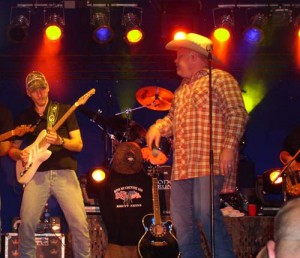 each of these artists had their own unique song style, and performance approach.
each of these artists had their own unique song style, and performance approach.
After sound check/rehearsal, dinner, and showers at the hotel, we were back at the concert site getting ready for the show. Dressed in our best, we hit the stage around eight o’clock and were off and running with David’s set. The outdoor stage faced an open field filled with 1000 or so concert-goers and they quickly became immersed in the show. This show ran like a grid and there was very little space between songs, some songs even running into the next song “medley style”, so I had very little time to think. Before I knew it, David’s set was over and Chad Brock was walking onto the stage as David walked off, the music never stopping. Chad’s set went equally as smooth, and by the time we played his last song of the set, his hit “She Said Yes”, I was starting to feel pretty comfortable on this stage.
Now it was time for Daryle Singletary’s part of the show. Both David’s, and Chad’s sets were of the modern country/pop kind of sound, and this used a style of guitar playing that was more familiar to me. But Daryle’s music was more rooted in traditional country music, so his set required a different approach on the guitar, much more use of the “chicken pickin” technique, and the use of a clean sound throughout. Fortunately, my overkill approach to preparing for this gig came in handy and Daryle looked over at me and smiled at a couple of points during the show, at one point even commenting over the mic “I’d like to introduce Eric Normand filling in on guitar tonight. He’s a Yankee, but we won’t hold that against him… (laughs)…He’s doing a fine job.” The crowd reacted approvingly, and my confidence continued to grow. This was great; I was winning over the bosses!
Finally, an hour and a half into this nonstop barrage of country music fun, it was time for Rhett’s eight or nine songs. Rhett’s music is as much southern rock 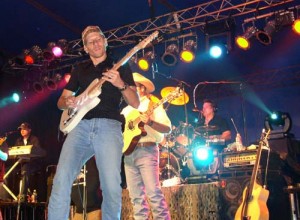 as it is country, and this driving approach was right up my alley. By the end of his set the crowd was in a frenzy and, after a brief pause, we began playing Hank Junior’s “All My Rowdy Friends Are Coming over Tonight” for the encore. The HTTP encore featured all four artists on the stage at once, each taking turns singing verses, and big harmonies on the choruses. We did three or four songs; each followed with a roaring applause, before retreating to the bus.
as it is country, and this driving approach was right up my alley. By the end of his set the crowd was in a frenzy and, after a brief pause, we began playing Hank Junior’s “All My Rowdy Friends Are Coming over Tonight” for the encore. The HTTP encore featured all four artists on the stage at once, each taking turns singing verses, and big harmonies on the choruses. We did three or four songs; each followed with a roaring applause, before retreating to the bus.
After the show, the artists and band members told me I did a great job and that they appreciated how seriously I took the gig. It was a great feeling to know that my mission was successful. A couple of days later I got a call from D. “I heard you did a great job. You even made Singletary happy, and that’s hard to do.” “Thanks, it was tons of fun, all the hard work paid off. I hope it comes up again.”
In the meantime, here’s to “Nailing It to the Floor”!
Rhett Akins plays the Bone Collector Fan Club Party with Michael Waddell and Special Guests
Last weekend the Rhett Akins tour rode into Harrisburg, Pennsylvania for what would be one of our coolest outings in a while. Fans of Michael Waddell and his popular hunting show “Bone Collector” were about to be treated to a special night of fun and music for the show’s third annual fan club party, and it was 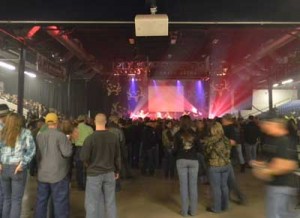 our job to provide some extra “lift” on this particular night. After a long day of setup and preparation the doors finally opened at 7 PM, and the “small arena” at the PA Farm Show Complex began to fill quickly with an excited crowd of hunting aficionados. The Bone Collector crew had laid out quite a spread, and the guests began enjoying the free buffet with a few cold ones while the sounds of Rhett’s hunting songs from “The Brotherhood Album” filled the air in a hall that looked ready for an Aerosmith concert.
our job to provide some extra “lift” on this particular night. After a long day of setup and preparation the doors finally opened at 7 PM, and the “small arena” at the PA Farm Show Complex began to fill quickly with an excited crowd of hunting aficionados. The Bone Collector crew had laid out quite a spread, and the guests began enjoying the free buffet with a few cold ones while the sounds of Rhett’s hunting songs from “The Brotherhood Album” filled the air in a hall that looked ready for an Aerosmith concert.
The place was filling up fast, and soon “Bone Collector” stars Michael, T-Bone, and Nick Mundt, were accompanied by some of the other show organizers on stage to offer a warm welcome to the crowd. After raffling off some free giveaways, the first performer, MCA recording artist Ashton Shepherd took the stage and played a short acoustic set with one of her bandmates, her clear, country voice filling the auditorium. Near the end of her set T-Bone came back out and invited a couple up onto the stage to deliver one more prize giveaway. Apparently, the couple were longtime fans of the show, and what at first looked like a raffle giveaway quickly became a more substantive moment when the fellow dropped to his knees and proposed to his unsuspecting fiancé. The woman had no idea this was going to happen, and was near tears as they danced on the stage to a touching serenade by Ashton. After a few more prize giveaways, Rhett and band took the stage.
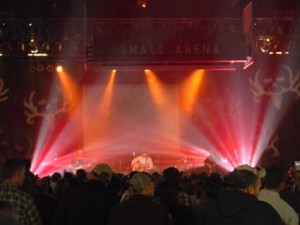 Our first tune was “My Baby Looks Good in Camouflage”, one of several hunting themed songs we would perform from Rhett’s latest album project, and the crowd was instantly singing along with this song that has never even been on the radio. Midway through the set, Rhett announced that we were going to play his song “Bird Dog” and asked if there was anyone in the crowd who knew the song and wanted to come up and sing along. Two fellows in the front row made their way onto the stage and joined Rhett for an “interesting” rendition, after which Rhett announced “Sorry, I won’t do that again.”
Our first tune was “My Baby Looks Good in Camouflage”, one of several hunting themed songs we would perform from Rhett’s latest album project, and the crowd was instantly singing along with this song that has never even been on the radio. Midway through the set, Rhett announced that we were going to play his song “Bird Dog” and asked if there was anyone in the crowd who knew the song and wanted to come up and sing along. Two fellows in the front row made their way onto the stage and joined Rhett for an “interesting” rendition, after which Rhett announced “Sorry, I won’t do that again.”
By the end of Rhett’s first rocking performance the place was buzzing with excitement, and many of the 1200 plus fans were crowded up to the front of the stage, standing elbow to elbow in a sea of camouflage. After a few more giveaways, Michael introduced the night’s unannounced “special guest” Aaron Lewis from the band Staind, and the crowd was treated to an intimate acoustic version of “It’s Been a While”, amidst his four song set.
It was now time for a final round of giveaways and Rhett’s second and final set to cap off the night. With a few big surprises still in store, Rhett kept the first part of this set short and sweet, and by the time we had played three or four songs he was inviting Ashton back up to the stage for an unplanned sit in. The two sang a heartfelt duet of the Hank Williams Jr. classic “Dinosaur” and the crowd roared with their approval. Next, Rhett brought up Michael to play some guitar, and Nick Mundt to sing Whitesnakes “In the Still of the Night”. Nick may be a hunter by trade, but it’s obvious that he may have been a rock ‘n roll front man in another life, as was evident from the bloodcurdling howl he let out at the beginning of the tune. His scream, combined with the sound of three electric guitars and our rhythm section thru a mega-watt PA system, threw the night into overdrive. The night was now beginning to feel like an episode of Don Kirshner’s “Rock Concert” and I ran out to the center of the stage to exude a little “attitude” with Nick during this fun moment, both of us getting down in a rockstar stance.
Now it was time for the grand finale and Michael’s 10-year-old son, Mason joined us to sing the final two songs. With Michael still on guitar, we launched into AC/DC’s “TNT” with some real fire and fury, and it was Mason who was now running the show, the crowd instantly showing their approval for one of the world’s youngest front men. While Mason worked the crowd, Nick and T-Bone sang backup vocals, the crowd now singing along too, and I was rocking out with Mike who was now showing off some of his new “guitar moves” that I had shared with him during our rehearsal earlier in the day. When the song ended, the crowd response was one of the biggest of the night, the roar almost deafening, and Nick hoisted young Mason up onto his shoulders for a victory lap. Not wanting this moment to end, we did one more song to take full advantage of our would-be rock ‘n roll army, the Guns and Roses classic “Welcome to the Jungle”, and again, young Mason was triumphant.
The song ended, and Michael stayed on guitar for the last song of our rock ‘n roll crescendo, Rhett’s rendition of “Last Chance for Mary Jane”, a real rarity. I don’t think I’ve played this many classic rock songs in a row since I moved to Nashville. It was kind of like going back in time and playing in one of my old top 40 bands, except through a million-dollar PA system, and with a bigger crowd! The concert ended and Michael was back on the mic thanking the crowd and his guests for being a part of this special night. Over the years I’ve played many “corporate” type events, and I can’t think of any that possessed the kind of fun and spirit that was in the room on this particular night. The folks at Bone Collector sure know how to throw a good bash and I can hardly wait for the next one!

